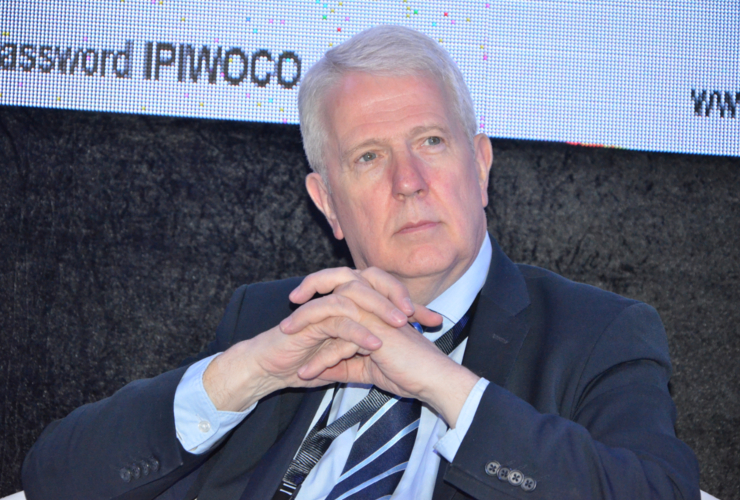For the third part in our series of interviews with the International Press Institute (IPI)’s new Executive Board members, this week took us to David Jordan, director of editorial policy at the BBC. With many years of editorial experience at the world’s best-known public broadcaster behind him, Jordan has a special insight into independent, reliable reporting.
The United Kingdom has a long, proud history of press freedom. However, with the UK due to exit the European Union next March, the country’s public service broadcaster faces new challenges as a license-fee funded, independent public broadcaster seeking to navigate increasing polarization and growing hostility toward the press.
Jordan, who was elected to the IPI Executive Board at IPI’s recent General Assembly in Abuja, Nigeria, shared his perspective on press freedom and the pressures of politics on the independence of the press, as well as on the phenomenon of “fake news”.
IPI: What challenges do you see the current political situation in the UK (Brexit and increasing political polarization) as having on independent journalism and on the editorial policies of the BBC?
David Jordan: One of the fundamental values of the BBC is impartiality, alongside its companion, accuracy. Achieving this to the satisfaction of our audiences if more difficult at times of political division. This is particularly acute when we have referendums running with binary questions: We had real challenges during the referendum on Scottish independence, and we’ve had real challenges during the Brexit debate, and in the aftermath, as both sides have continued to spar with each other and have tried, at times, to blame the BBC for the outcome or the way that the BBC has responded to the referendum. These are difficult times for public broadcasters committed to impartiality, not just in the UK but across the whole world.
IPI: What would you describe as your main aim as the BBC’s director of editorial policy?
David Jordan: I have to try and ensure that the BBC’s output, both in the UK and across the world, is consistent with our editorial values and standards. As part of my job I am also in charge of the BBC’s complaints system as part of our accountability agenda. Openness is key to both: We publish our responses, we allow appeals in cases where complaints are not upheld.
IPI: What are the greatest challenges in terms of defending quality, independent public service broadcasters in Europe today, and how well are these broadcasters meeting that challenge?
David Jordan: Obviously there is a hostile environment to public service broadcasting in several countries, influenced by the political complexion of the day. There’s also a commercial issue: Broadcasters in general have begun to operate in territory which newspapers also operate in – the online space – and this has caused conflicts. Given the financial difficulties for some commercial private media, public service broadcasters are often blamed. This argument is made very vociferously in the UK, as well as in Denmark, where it has had very serious consequences. There is some hope, though – the referendum in Switzerland showed that, push comes to shove, people do see a value in having a public service broadcaster.
IPI: Why is it important for organizations like the BBC to be part of the IPI network?
David Jordan: I think the fundamentally important aspects of IPI for the BBC is the IPI’s commitment to two things: freedom of expression and, something very important to the BBC, the safety and security of journalists across the world. Both of these issues are very important to the BBC and it is a great privilege for us to be able to support this work IPI does across the world.
IPI: How can organizations like IPI ensure independent, quality journalism thrives in the era of digitalisation and so-called “fake news”?
David Jordan: Thankfully, there are huge numbers of initiatives towards ways of distinguishing reliable news sources from the less reliable. IPI can play a valuable role – it’s an organization consisting of a large number of media organizations, so it can play a role in disseminating best practice and fresh ideas on how to best combat ‘fake news’. Fundamentally, though, the organizations have to stay true to their values.
IPI: The term “fake news” is being used by governments in order to discredit reliable news sources. How do you view this?
David Jordan: I think that is a really dangerous thing for governments and politicians to do. Some – and there are a couple in the UK who are guilty of this – don’t understand that they are playing with fire. It is critically important for society that there are credible news sources – undermining these sources over time is very dangerous, and something that sensible and responsible politicians should not indulge in.
Interview by Alexander White for IPI.
[separator style_type=”none” top_margin=”15″ bottom_margin=”20″ sep_color=”#eae9e9″ border_size=”” icon=”” icon_circle=”no” icon_circle_color=”#ffffff” width=”” alignment=”center” class=”” id=””]
[content_boxes layout=”clean-horizontal” columns=”1″ icon_align=”left” title_size=”18″ backgroundcolor=”#dcdadb” icon_circle=”” icon_circle_radius=”” iconcolor=”#dcdadb” circlecolor=”#dcdadb” circlebordercolor=”#dcdadb” circlebordercolorsize=”” outercirclebordercolor=”#dcdadb” outercirclebordercolorsize=”” icon_size=”” link_type=”” link_area=”” animation_delay=”” animation_offset=”” animation_type=”0″ animation_direction=”down” animation_speed=”0.1″ margin_top=”0″ margin_bottom=”0″ class=”” id=””]
[content_box title=”” icon=”” backgroundcolor=”#dcdadb” iconcolor=”#000000″ circlecolor=”#dcdadb” circlebordercolor=”” circlebordercolorsize=”” outercirclebordercolor=”” outercirclebordercolorsize=”” iconrotate=”” iconspin=”no” image=”” image_width=”35″ image_height=”35″ link=”” linktarget=”_self” linktext=”” animation_type=”0″ animation_direction=”down” animation_speed=”0.1″]
Read more from our series of interviews with new IPI Executive Board members:
#MemberInterview: Tom Mshindi on future of Kenya’s media (Tom Mshindi, editor-in-chief, Nation Media Group, Kenya)
#MemberInterview: Khadija Patel on presidents, political interference and the free press (Khadija Patel, editor-in-chief, Mail&Guardian, South Africa)
[/content_box]
[/content_boxes]
